Back in my teeth-cutting days as a journalist, we were always told a good headline/title will hook the readers. Today, we call that click bait, did it work?
So, what’s this missive about? Well, my initials are KT and I’m going to espouse the importance of and some best practices of good Knowledge Transfers (KTs). The beginning of any good KT is the KD, Knowledge Discovery.
Knowledge Discovery is the process of identifying the type of knowledge that exists on your team, understanding who owns the knowledge, recognizing gaps in your knowledge, and exposing the enablers and barriers in attaining the knowledge. The value of a proper KD process includes:
- Reducing single points of dependency
- Increasing awareness of you team’s knowledge needs
- Enabling proactive decision making and problem solving by using a standard process for evaluating and transferring knowledge and expertise
Knowledge Discovery for Knowledge Transfer
Providing a process for Knowledge Discovery offers the opportunity for organizations to achieve more effective and efficient knowledge sharing and transfers, expanding staff capabilities and providing layers of subject matter expertise.
Knowledge Capture
Use the correct methods that suit your organization for gathering its knowledge. With teams being globally disseminated and working remotely, some of the tried and true ways to capture knowledge need to be adjusted. Shadowing or side chairing with a colleague to capture and transfer knowledge may have to be converted to remote working sessions. In this scenario, the SME literally walks through a process with the learner step-by-step and records the lesson for on demand playback. Of course, other methods for knowledge capture can be universally applied like documenting processes and procedures. Remember to create the most effective ways for creating, storing, retrieving, and transferring the knowledge within your organization.
Knowledge Mapping
A knowledge map is a visual that shows where knowledge can be found within a company or organization. It includes knowledge rather than information, and that knowledge is accessed rather than searched for and found.

I enjoy using knowledge mapping tools, and there are a number of them out there today. Pick the one that specifically suits your organization.
Assessment
Be brutally honest about the criticality of your team’s knowledge. In the daily life of the business, how important is the knowledge your team has to achieving the enterprise goals? Creating a simple grading scale, like 1 (not important) to 5 (critical), can help you evaluate your knowledge base. Collect continuous feedback to improve the process.
Maintenance
We all love creating or gathering, but maintaining, not so much. To have effective knowledge sharing and transfers, you must:
- Keep a solid knowledge base that is easily accessible at all levels of your organization
- Commit resources and retain the organizations knowledge objectives and strategy
How you discover knowledge determines how well your organization can share and transfer that knowledge. There’s an old saying, “knowledge is power.” I’d like to respectfully disagree with that by stating that knowledge without sharing and transferring it is useless. If it’s just mine, then it has no power or purpose, so share and transfer away!
More Knowledge Management
As you prepare your organization for a new knowledge-centric future, there are strategic steps you can start taking now. Download our Demise of the Document perspective to change the way you think about documents and learn how to start managing knowledge instead.
